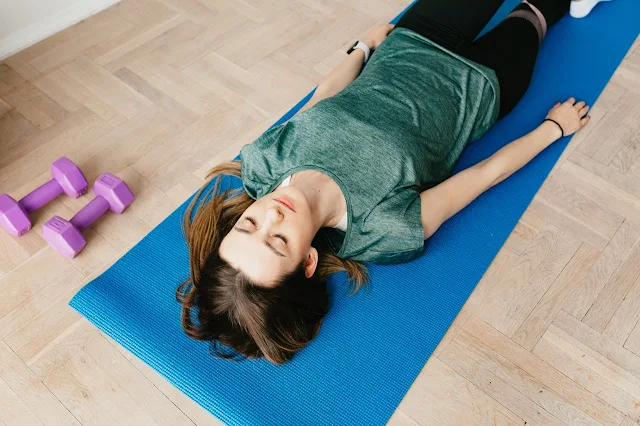Maintaining healthy blood
pressure is crucial for overall well-being. High blood pressure, or
hypertension, can lead to severe health complications, including heart disease
and stroke. While medication is often necessary, incorporating yoga into your
daily routine can naturally help lower blood pressure. Here are ten yoga poses
that can help you manage and reduce your blood pressure effectively.
Sukhasana, or Easy Pose, is
a simple seated posture that promotes relaxation and calmness. This pose helps
reduce stress, which can be a contributing factor to high blood pressure.
How to Perform:
- Sit cross-legged on the floor.
- Keep your spine straight and your hands
resting on your knees.
- Close your eyes and take deep, slow breaths.
- Stay in this position for 5-10 minutes.
2. Balasana (Child’s Pose)
Balasana, or Child’s Pose,
is a gentle resting pose that calms the mind and relieves stress and fatigue,
which can help lower blood pressure.
How to Perform:
- Kneel on the floor with your big toes touching
and knees spread apart.
- Sit back on your heels and stretch your arms
forward, lowering your forehead to the ground.
- Hold this position for a few minutes,
breathing deeply.
3. Viparita Karani (Legs Up the Wall Pose)
Viparita Karani, or Legs Up
the Wall Pose, is a restorative pose that improves circulation and helps reduce
stress and anxiety.
How to Perform:
- Lie on your back near a wall.
- Lift your legs and rest them against the wall,
keeping your body in an L shape.
- Relax your arms by your sides and breathe
deeply.
- Stay in this position for 5-10 minutes.
4. Setu Bandhasana (Bridge Pose)
Setu Bandhasana, or Bridge
Pose, is beneficial for the heart and helps improve blood circulation, which
can aid in reducing blood pressure.
How to Perform:
- Lie on your back with your knees bent and feet
flat on the floor.
- Lift your hips towards the ceiling, keeping
your shoulders and head on the ground.
- Clasp your hands under your back and hold the
pose for a few breaths.
5. Paschimottanasana (Seated Forward Bend)
Paschimottanasana, or Seated
Forward Bend, helps calm the mind and stretch the body, reducing stress and
helping lower blood pressure.
How to Perform:
- Sit on the floor with your legs extended
straight in front of you.
- Inhale and lengthen your spine, then exhale
and bend forward, reaching for your feet.
- Hold this position for a few minutes,
breathing deeply.
6. Janu Sirsasana (Head-to-Knee Forward Bend)
Janu Sirsasana, or
Head-to-Knee Forward Bend, is a calming pose that stretches the spine,
shoulders, and hamstrings, helping to reduce anxiety and lower blood pressure.
How to Perform:
- Sit on the floor with one leg extended and the
other bent, with the foot touching the inner thigh of the extended leg.
- Inhale and lengthen your spine, then exhale
and bend forward, reaching for the extended foot.
- Hold this position for a few breaths and then
switch sides.
7. Uttanasana (Standing Forward Bend)
Uttanasana, or Standing
Forward Bend, helps calm the mind and relieve stress, which can help lower
blood pressure.
How to Perform:
- Stand with your feet hip-width apart.
- Inhale and raise your arms overhead, then
exhale and bend forward at the hips, reaching for the floor or your
ankles.
- Hold this position for a few breaths.
8. Adho Mukha Svanasana (Downward-Facing Dog)
Adho Mukha Svanasana, or
Downward-Facing Dog, is an inversion pose that helps improve circulation and
relieve stress.
How to Perform:
- Start on your hands and knees, with your
wrists under your shoulders and knees under your hips.
- Lift your hips towards the ceiling,
straightening your legs and forming an inverted V shape.
- Hold this position for a few breaths.
9. Shavasana (Corpse Pose)
Shavasana, or Corpse Pose,
is a relaxation pose that helps lower blood pressure by calming the nervous
system and reducing stress.
How to Perform:
- Lie flat on your back with your legs extended
and arms resting by your sides.
- Close your eyes and take slow, deep breaths,
relaxing each part of your body.
- Stay in this position for 5-10 minutes.
10. Anulom Vilom (Alternate Nostril Breathing)
Anulom Vilom, or Alternate
Nostril Breathing, is a pranayama (breathing) technique that helps balance the
nervous system and reduce stress.
How to Perform:
- Sit comfortably with your spine straight.
- Close your right nostril with your thumb and
inhale deeply through your left nostril.
- Close your left nostril with your ring finger
and exhale through your right nostril.
- Continue this pattern for a few minutes.

.jpg)

.jpeg)







